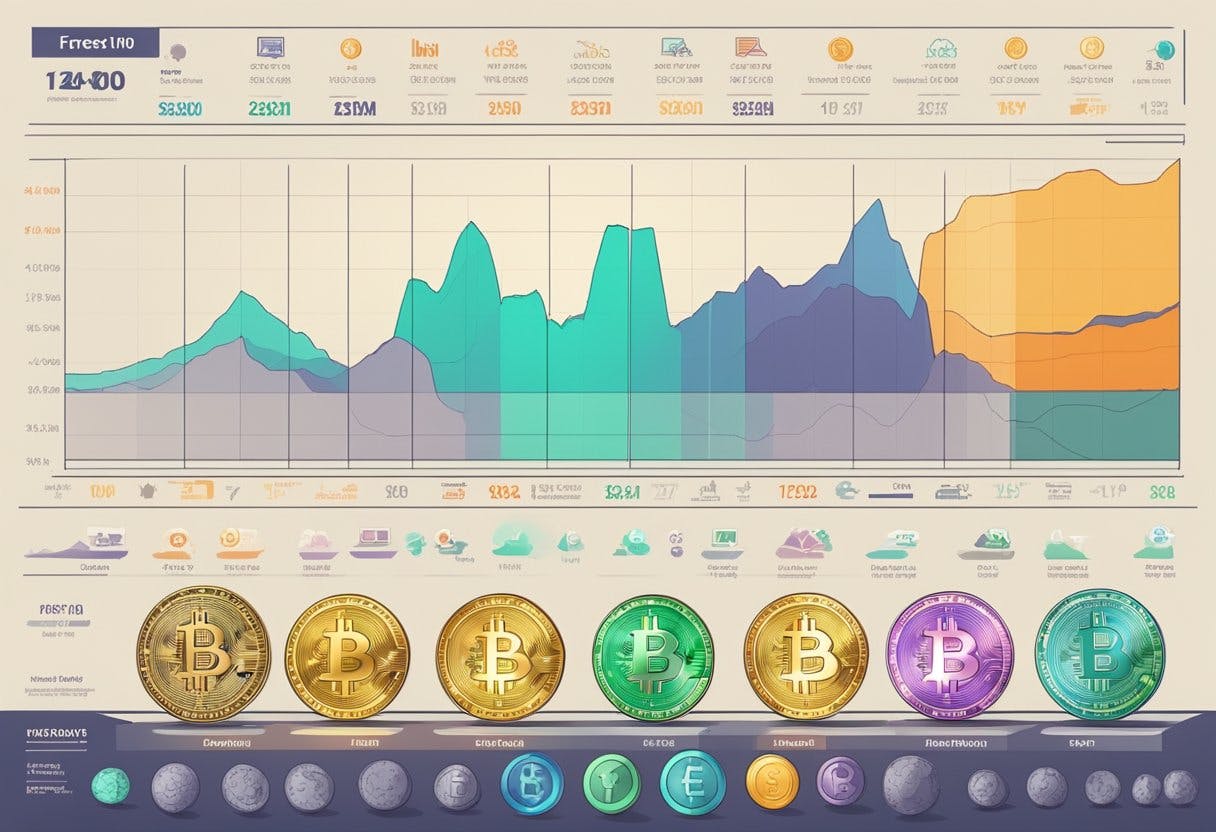
The world of currency trading has evolved significantly over the past decade, with the introduction of cryptocurrencies being one of the most significant changes. With the increasing popularity of cryptocurrencies, it is no surprise that traders are now looking to trade forex pairs that include cryptocurrencies. The potential of cryptocurrency pairs in forex trading is vast and could revolutionize the way traders approach the market.

The integration of cryptocurrencies into the forex market has been gradual, but the potential is undeniable. The volatility of cryptocurrencies presents both risks and opportunities for traders, and the potential for high returns is a significant attraction. However, regulatory and security considerations are crucial factors that must be taken into account when trading cryptocurrency pairs. As the market continues to evolve, it will be interesting to see how traders adapt to these new dynamics.
Key Takeaways
- Cryptocurrency pairs have the potential to revolutionize the forex market.
- The integration of cryptocurrencies into forex trading presents both risks and opportunities.
- Regulatory and security considerations must be taken into account when trading cryptocurrency pairs.
The Evolution of Forex and Cryptocurrency

Historical Context of Forex and Crypto
Foreign exchange, commonly known as forex, is the largest financial market in the world, with an estimated daily turnover of $6.6 trillion in 2019. Forex trading involves the buying and selling of fiat currencies, such as the US dollar, Euro, and Japanese yen. The forex market has been in existence for centuries, with the first recorded currency exchange taking place in the 4th century BC.
On the other hand, cryptocurrencies are digital assets that use cryptography to secure their transactions and to control the creation of new units. The first cryptocurrency, Bitcoin, was created in 2009, and since then, thousands of other cryptocurrencies have emerged.
The forex market and the cryptocurrency market share some similarities, such as the use of charts and technical analysis to predict price movements. However, they also have significant differences, such as the fact that the forex market is highly regulated, while the cryptocurrency market is largely unregulated.
Comparative Analysis of Forex Pairs and Crypto Pairs
Forex pairs are currency pairs that are traded in the forex market. The most commonly traded forex pairs include the EUR/USD, USD/JPY, and GBP/USD. In contrast, crypto pairs are cryptocurrency pairs that are traded in the cryptocurrency market. The most commonly traded crypto pairs include BTC/USD, ETH/USD, and LTC/USD.
One of the main advantages of trading forex pairs is that they are highly liquid and have low transaction costs. In contrast, trading crypto pairs can be more expensive due to the high volatility of the cryptocurrency market and the lack of liquidity in some crypto pairs.
Another advantage of trading forex pairs is that they are less volatile than crypto pairs. Forex pairs tend to move in smaller increments, making them less risky for traders. In contrast, crypto pairs can experience large price swings in a short period, making them more suitable for traders with a higher risk tolerance.
In conclusion, the evolution of forex and cryptocurrency has created new opportunities for traders to profit from the financial markets. While both markets share some similarities, they also have significant differences that traders need to be aware of. By understanding the comparative analysis of forex pairs and crypto pairs, traders can make informed decisions about which market to trade and which pairs to trade within each market.
Technological Impact on Currency Trading

The world of Forex trading is constantly evolving, and technology has played a significant role in driving this transformation. The use of blockchain technology, artificial intelligence, and machine learning has revolutionized the way traders approach currency trading.
Blockchain Technology in Forex
Blockchain technology has disrupted the traditional methods of currency exchange by providing a decentralized platform for transactions. It has eliminated the need for intermediaries, such as banks and other financial institutions, which has resulted in lower transaction fees and faster processing times.
Blockchain technology has also provided greater transparency and security in currency trading. The technology uses a distributed ledger system that records all transactions in real-time, making it impossible to manipulate or alter the data. This has increased trust among traders and has made the currency trading process more secure.
Artificial Intelligence and Machine Learning
Artificial intelligence and machine learning have also made a significant impact on Forex trading. These technologies have enabled traders to analyze vast amounts of data and make informed decisions based on real-time market trends.
Algorithms and automation have also played a significant role in currency trading. Automated trading systems use algorithms to execute trades automatically, based on pre-defined rules and parameters. This has eliminated the need for manual intervention, resulting in faster and more accurate trade executions.
In conclusion, technological advancements have had a significant impact on the world of Forex trading. The use of blockchain technology, artificial intelligence, and machine learning has transformed the way traders approach currency trading. These technologies have provided greater transparency, security, and efficiency in currency trading, and they are expected to play an even more significant role in the future of Forex trading.
Regulatory and Security Considerations

Global Regulatory Frameworks
When it comes to cryptocurrency trading, regulatory frameworks vary from country to country. Some countries have taken a more proactive approach to regulating cryptocurrencies, while others have taken a more hands-off approach. This regulatory uncertainty has made it difficult for traders to navigate the cryptocurrency market, leading to a lack of confidence in the market.
Regulatory bodies around the world are beginning to take notice of the cryptocurrency market and its potential risks. In the US, the Securities and Exchange Commission (SEC) has been cracking down on fraudulent initial coin offerings (ICOs), while the Commodity Futures Trading Commission (CFTC) has been regulating Bitcoin futures trading. Similarly, the European Union has proposed a comprehensive set of regulations for cryptocurrencies, which would require cryptocurrency exchanges to register with regulators and implement anti-money laundering measures.
Security Challenges and Measures
One of the biggest challenges facing the cryptocurrency market is security. Cryptocurrency exchanges and wallets have been targeted by hackers, resulting in the theft of millions of dollars worth of cryptocurrencies. To combat this, exchanges and wallets have implemented a variety of security measures, such as two-factor authentication and cold storage.
In addition to theft, the cryptocurrency market is also vulnerable to fraud and money laundering. To address these issues, regulatory bodies are increasing their scrutiny of the cryptocurrency market. For example, the Financial Crimes Enforcement Network (FinCEN) in the US has issued guidance on virtual currency transactions, while the Financial Action Task Force (FATF) has recommended that countries implement regulations to prevent money laundering and terrorist financing through cryptocurrencies.
Overall, the regulatory and security considerations surrounding cryptocurrency trading are complex and ever-evolving. Traders must stay up-to-date on the latest regulations and security measures to ensure that they are trading in a safe and compliant manner.
Market Dynamics and Trader Behavior
Liquidity and Volatility in Crypto Pairs
Trading in cryptocurrency pairs has become an increasingly popular option for traders and investors looking for new opportunities in the forex market. One of the key features of these pairs is their high liquidity, which is driven by the large number of traders and investors who are actively buying and selling these currencies. This high level of liquidity means that traders can easily enter and exit positions, which can help to minimize risk and maximize potential profits.
At the same time, crypto pairs are also known for their high volatility, which can create both risks and opportunities for traders. Volatility refers to the degree of price movement in a currency pair, and it is often driven by a range of factors, including demand, market manipulation, and trends. While high volatility can create opportunities for traders to profit from large price movements, it can also increase risk and make it more difficult to predict future price movements.
Investor and Trader Sentiment
Another important factor that can influence the dynamics of the crypto market is investor and trader sentiment. Sentiment refers to the overall mood or attitude of traders and investors towards a particular currency or market. Positive sentiment can help to drive demand for a currency, while negative sentiment can lead to a decrease in demand and lower prices.
In the world of cryptocurrency, sentiment can be influenced by a range of factors, including news events, social media trends, and changes in market conditions. Traders and investors who are able to accurately gauge sentiment can potentially profit from changes in market conditions, while those who fail to do so may be at risk of losses.
Overall, while the crypto market can be complex and challenging to navigate, it also offers a range of potential trading opportunities for those who are willing to put in the time and effort to understand its dynamics. By keeping an eye on factors such as liquidity, volatility, and sentiment, traders and investors can potentially profit from changes in the market and take advantage of new opportunities as they arise.
The Future of Forex and Cryptocurrency Integration
As cryptocurrencies continue to gain popularity, they are increasingly being integrated into the forex market. The integration of cryptocurrencies and forex presents both challenges and opportunities for brokers and investors. In this section, we will explore predictions, potential innovations, challenges, and opportunities for the integration of cryptocurrencies into the forex market.
Predictions and Potential Innovations
The integration of cryptocurrencies and forex is expected to bring about several innovations. One of the most significant predictions is that the use of cryptocurrencies will increase transparency and reduce transaction costs. Cryptocurrencies are decentralized, which means that they are not controlled by any central authority. This feature makes them ideal for forex trading, where transparency is crucial.
Another potential innovation is the use of blockchain technology in forex trading. Blockchain technology is a decentralized ledger that records all transactions in a secure and transparent manner. The use of blockchain technology in forex trading would increase the speed and security of transactions, reduce costs, and eliminate the need for intermediaries.
Challenges and Opportunities for Brokers and Investors
The integration of cryptocurrencies and forex also presents several challenges and opportunities for brokers and investors. One of the main challenges is the lack of regulation in the cryptocurrency market. Cryptocurrencies are not regulated by any central authority, which makes them vulnerable to fraud and market manipulation. Therefore, brokers and investors need to be cautious when trading in cryptocurrencies.
However, the lack of regulation also presents opportunities for institutional investors and financial services. Institutional investors can take advantage of the lack of regulation to invest in cryptocurrencies and diversify their portfolios. Financial services can also offer new products and services that cater to the needs of investors who want to trade in cryptocurrencies.
In conclusion, the integration of cryptocurrencies and forex presents both challenges and opportunities. While the lack of regulation in the cryptocurrency market is a challenge, it also presents opportunities for institutional investors and financial services. The use of cryptocurrencies and blockchain technology is expected to bring about several innovations that will increase transparency and reduce transaction costs.
Frequently Asked Questions
How do cryptocurrencies compare to traditional forex in terms of trading volatility?
Cryptocurrencies are generally considered to be more volatile than traditional forex pairs due to their relatively small market size and lack of regulation. While this can lead to significant profit potential, it also carries a higher level of risk. Traders should be aware of the increased volatility and adjust their trading strategies accordingly.
What are the implications of decentralized platforms on the future of forex trading?
Decentralized platforms, such as blockchain-based exchanges, have the potential to disrupt traditional forex trading by offering a more transparent and secure trading environment. This could lead to increased adoption of cryptocurrencies in forex trading and a shift away from centralized exchanges.
Can artificial intelligence significantly disrupt the forex trading market?
Artificial intelligence (AI) has the potential to significantly disrupt the forex trading market by automating many of the tasks traditionally performed by human traders. This could lead to increased efficiency and accuracy in trading, but could also result in job losses and a shift in the balance of power in the market.
What are the key differences between day trading in forex and cryptocurrency markets?
Day trading in forex and cryptocurrency markets requires a different set of skills and strategies due to the different levels of volatility and liquidity. Cryptocurrency markets tend to be more volatile and less liquid than traditional forex markets, which can make them more challenging for day traders. However, they also offer greater profit potential.
What strategies should traders consider when dealing with cryptocurrency pairs in forex markets?
Traders should consider a range of strategies when dealing with cryptocurrency pairs in forex markets, including technical analysis, fundamental analysis, and risk management. They should also be aware of the unique characteristics of cryptocurrencies, such as their volatility and lack of regulation, and adjust their strategies accordingly.
What potential does the emerging cryptocurrency market hold for long-term forex investment?
The emerging cryptocurrency market holds significant potential for long-term forex investment due to its high growth potential and lack of correlation with traditional asset classes. However, investors should be aware of the risks involved, such as volatility and lack of regulation, and should conduct thorough research before making any investment decisions.
Read More



